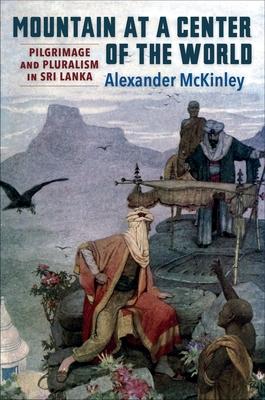At the pilgrimage site of Adam's Peak in Sri Lanka, a footprint is embedded atop the mountain summit. Buddhists hold that it was left by the Buddha, Hindus say Lord Siva, and Muslims and Christians identify it with Adam, the first man. The Sri Lankan state, for its part, often uses the Peak as a prop to convey a harmonious image of religious pluralism, despite increasing Buddhist hegemony. How should the diversity of this place be understood historically and managed practically?
Considering the varied heritage of this sacred site, Alexander McKinley develops a new account of pluralism based in political ecology, representing the full array of actors and issues on the mountain. From its diverse people to rare species to deep geology, the Peak exemplifies a planetary pluralism that recognizes a multiplicity of beings while accepting competition and disorder. Taking a place-based approach, McKinley casts the mountain as an actor, exploring how its rocks, forests, and waters promote pilgrimage, inspire storytelling, and make ethical demands on human communities. Combining history and ethnography while furnishing original translations of sources from Pali, Sinhala, and Tamil, this multidisciplinary and stylistically innovative book shows how religious traditions share literal common ground in their reverence for the mountain.
Book
Mountain at a Center of the World: Pilgrimage and Pluralism in Sri Lanka
(Write a Review)
Paperback
$38.89
At the pilgrimage site of Adam's Peak in Sri Lanka, a footprint is embedded atop the mountain summit. Buddhists hold that it was left by the Buddha, Hindus say Lord Siva, and Muslims and Christians identify it with Adam, the first man. The Sri Lankan state, for its part, often uses the Peak as a prop to convey a harmonious image of religious pluralism, despite increasing Buddhist hegemony. How should the diversity of this place be understood historically and managed practically?
Considering the varied heritage of this sacred site, Alexander McKinley develops a new account of pluralism based in political ecology, representing the full array of actors and issues on the mountain. From its diverse people to rare species to deep geology, the Peak exemplifies a planetary pluralism that recognizes a multiplicity of beings while accepting competition and disorder. Taking a place-based approach, McKinley casts the mountain as an actor, exploring how its rocks, forests, and waters promote pilgrimage, inspire storytelling, and make ethical demands on human communities. Combining history and ethnography while furnishing original translations of sources from Pali, Sinhala, and Tamil, this multidisciplinary and stylistically innovative book shows how religious traditions share literal common ground in their reverence for the mountain.Paperback
$38.89